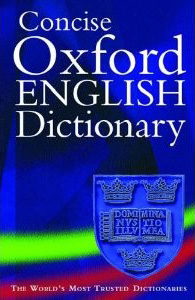 This is too fun to pass up. Every couple of years, one of the major English dictionaries comes out with a new edition, and the news reports dutifully alert us to the “new words” which have become “officially” a new word. Oxford University Press has just published an update to its Concise Oxford English Dictionary. So, now “retweet” is a word, and so is “denialist”:
This is too fun to pass up. Every couple of years, one of the major English dictionaries comes out with a new edition, and the news reports dutifully alert us to the “new words” which have become “officially” a new word. Oxford University Press has just published an update to its Concise Oxford English Dictionary. So, now “retweet” is a word, and so is “denialist”:
denialist: n. a person who refuses to admit the truth of a concept or proposition that is supported by the majority of scientific or historical evidence.
Hmmm . . . And, someone that sounds like my grandmother:
domestic goddess: n. informal a woman with exceptional domestic skills, especially cookery.
(I wonder if there is a male form of this noun — “domestic god”?) The fallacy in all this reporting, of course (and here’s where it connects to theology and Scripture), is that dictionaries do not “define” or “authorize” words, they simply reflect current usage. It is not as if a bunch of really smart people in tweed jackets gather for a yearly conference where they smoke pipes, drink single-malt scotch and banter about potential words — Imagine the scene: “‘snardologist?’ Yes, we need a word to describe someone who studies ‘snards,’ which of course have not been invented yet but we’d better have a word ready for when they are.” Words are created by, well, anyone, and if, well, two or three agree, it becomes a word. And when enough people use it that eventually clueless people (like me) hear words like “jegging,” we need to either google it or, less likely, buy a dictionary to tell us what it means.
Point is, we theologians and pastors too often operate as if a word “really means” what the dictionary says it means. But the dictionary itself does not give a definition that defines a word, that is, give the definitive meaning (see how tricky this is, we’ve moved “define” from “giving a summary of usage” to “making it so,” Jean Luc Picard-style). It is even worse if you go back to the Latin root verb, definio, which can mean “to fix the limits,” “to put an end to,” “to determine the course, nature of,” “give an exact description of, define, sum up,” or even “state definitely, assert.” Which of these helps us understand a dictionary “definition”? Probably “give an exact description of, define, sum up” — it is the “summing up” part that is key. “Summing up” means that dictionary makers are putting into paper and ink (or html) what you think lots of other people would mean when they used a particular word. But this can be tricky, and of course the Oxford Dictionary people know this. Angus Stevenson, editor of this new edition of the dictionary, points out that even the “definitions” reflect the biases of the dictionariologist (I made that word up, but you know what it means anyway):
In 1911 the cancan was a relatively new thing, associated with the ‘naughty nineties’ (the 1890s) in Paris. The Fowlers [dictionary editors] were in no doubt about their opinion of this racy French craze – they defined it simply as ‘indecent dance’. (They weren’t the only Oxford authors with a lofty attitude towards the cancan: Percy Scholes, editor of the first Oxford Companion to Music (1938), wrote that ‘Its exact nature is unknown to anyone connected with this Companion.’) The Fowlers weren’t puritans, but they were men of their time, and it’s not certain what they’d have made of the new sense of cougar – now no longer their ‘large American feline quadruped’ but now also ‘an older woman seeking a sexual relationship with a younger man’.
And, of course, today’s “woot” might become tomorrow’s “foozle.” Stevenson writes:
Sadly, the new edition has no room for tremendous words like brabble ‘paltry noisy quarrel’ and growlery ‘place to growl in, private room, den’ – what we might call a man cave these days. But the preoccupations of today’s Generation Y have opened the door to some equally colourful vocabulary – how about momo, noob, nurdle, and woot?
[footnote: I think growlery would now be an “unmoderated blog site.” And, I was concerned when I saw “momo,” which is what my daughter named one of our chickens. Turns out is only an Asian dumpling. I’ve eaten them without knowing what they are].
And, most confusing, some words look the same, but come to mean something entirely different (again, Stevenson:)
Among the new meanings added to the 12th edition of the Concise is one for follower, ‘someone who is tracking a particular person, group, etc. on a social networking site’. In dictionaries of current English some senses which have fallen into disuse have to be removed to make way for new ones such as this: for example, we no longer give the first edition’s sense of ‘man courting maidservant’. Another new sense is at friend, where the primary meaning hasn’t changed much since the first edition, though the definition there has a poetic quality that the current one perhaps lacks: ‘one joined to another in intimacy & mutual benevolence independent of sexual or family love’. It’s the secondary senses that have changed – the new meaning is ‘a contact on a social networking website’, while the first edition had ‘person who acts for one, e.g. as second in duel’.
Now, we probably know all this, at least intuitively, in our everyday language use. Try reading a sermon that you preached twenty years ago. Aside from shuddering at its inanity, you’d probably pick out a few words that people today would puzzle over. But what about the Bible, and theology? Scripture is “clear” (claritas scripturae — if you say it in Latin, then you know you have precisely the correct formulation and there will be no confusion. That’s irony, in case you were wondering). Or is it? We, of course, do not read Greek or Hebrew as our first language, and even if we did, our Greek and Hebrew would not be same as the authors and initial hearers of those texts.
Let me give a non-theologically controversial example (which I’ve used before). At 1 Cor 10:25, the King James translators gave us the following: “Whatsoever is sold in the shambles, that eat, asking no question for conscience sake.” Good advice, I wouldn’t eat anything sold in a “shambles” either. Problem is, shambles in Elizabethan English referred to a “meat market.” So the NASB, NIV and ESV all use here “meat market” (the Wycliffe translation from the Vulgate used “butchery”. Mmmm, tasty). The Greek in question is ἐν μακέλλῳ (I can’ t get the iota subscript to display properly), which is actually a loan word from Latin: macellum. The Old Latin and Vulgate turn this back into Latin: in macello. The standard Greek lexicon of the NT gives us, a bit ambiguously, “meat market, food market.” The difference between those two seems small, but notice that in a meat market you can only buy meat, but in a food market you’d find vegatables, spices, and maybe the odd Twinkie (2000 years from now, no doubt a future archeologist will dig up a perfectly intact and loaded with preservatives Twinkie from some mound covering a Walmart Supercenter). So what do we go with? Does the dictionary “define” the word?
 Now, we know an awful lot about macelli in Roman cities during the imperial period. We know their layout, we know what was sold in them. No decent Roman town would be without them. And, turns out that in a macellum you could buy not only meat but also fish and other perishable goods, including grain (the dedicatory inscription from the macellum at Corinth has been discovered; it is called a macellum…et piscarium). So a better translation of 1 Cor 10:25 would be: “eat whatever is sold in the marketplace. . .” (for the exegetical implications, see here, beginning on p. 192; for access to ATLA, see here).
Now, we know an awful lot about macelli in Roman cities during the imperial period. We know their layout, we know what was sold in them. No decent Roman town would be without them. And, turns out that in a macellum you could buy not only meat but also fish and other perishable goods, including grain (the dedicatory inscription from the macellum at Corinth has been discovered; it is called a macellum…et piscarium). So a better translation of 1 Cor 10:25 would be: “eat whatever is sold in the marketplace. . .” (for the exegetical implications, see here, beginning on p. 192; for access to ATLA, see here).
Why am I going through all this (it has taken me longer than I expected)? Because especially when it comes to ancient texts we cannot know exactly what a word means, and dictionaries are not always decisive. A given dictionary merely represents the editors’ attempts to summarize how they have tabulated (hopefully) numerous examples of contemporaneous usage of the word. This is why a good reference dictionary, like the Danker lexicon of the NT, always gives references to parallel material. Those references are not for merely for antiquarian interest, they are supporting examples for the “definition” — they are what is being “summed up” in the “definition.”
So, when we come to words like “justification” and “sanctification,” what, exactly, do those words “mean”? We think we know, and we could probably find a lexicon to tell us what we would like them to mean. But, chances are, what we think they mean and what they would have been heard as by the churches in Rome or Galatia are likely two different things. All of which is not to fall into some kind of pop-post-modern version of “there is no such thing as meaning,” but to help us remember that all of this requires study, careful attention, humility, and yes, “reason.”
And, when we talk with one another (and, much less helpfully, about one another) , we need to be careful what words we use to describe each other. What is a “Lutheran”? Who decides? What is “confessional”? And who decides? What is “Christian”? And who decides? Perhaps we could call up the tweed-jacket people at Oxford Press. And they’d tell us to get together and sort it out. Which sounds like pretty good advice.

Leave a Reply
You must be logged in to post a comment.